Dissecting Key Aspects of the Political Landscape
Northwestern workshop offers annual venue for thought-provoking research, networking
Get all our news
One of the aspects that people enjoy most about CAB is the opportunity to meet scholars from other institutions... these meetings have produced subsequent interactions and, in many cases, collaborations.”
James Druckman
IPR political scientist
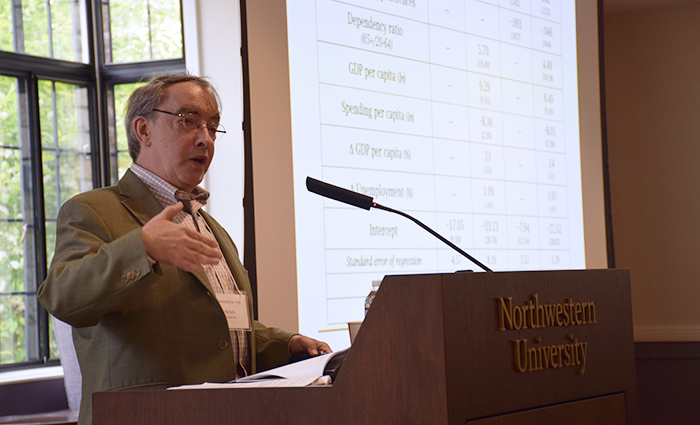
Larry Bartels of Vanderbilt University presents his research on political responsiveness at the May 5 CAB workshop.
The 11th annual Chicago Area Political and Social Behavior Workshop (CAB) focused on key aspects shaping the current political landscape, “highlighting the reach of politics in topics such as wealth, geography, homes, and journalism,” said IPR political scientist James Druckman in opening the workshop on May 5 at Northwestern University’s Evanston Campus.
The presentations by four of the nation’s established and rising political and social scholars, including esteemed Vanderbilt political scientist Larry Bartels, set the stage for a full day of exchange and networking among the more than 100 faculty and graduate students from the Midwest and beyond.
Many were returning participants, such as Mike Wagner of the University of Wisconsin–Madison, also one of the day’s presenters. He credited a presentation by Princeton’s Tali Mendelberg at CAB 2014 for generating the idea for an experiment he discussed this year.
For Druckman, those are the types of connections that the workshop is all about.
“One of the aspects that people enjoy most about CAB is the opportunity to meet scholars from other institutions,” he said. “These meetings have produced subsequent interactions and, in many cases, collaborations.”
Political Responsiveness and Wealth
When it comes to influencing policy outcomes in democratic nations, do the preferences of less affluent constituents matter?
Bartels has found U.S. political responsiveness is “strongly tilted” toward the more affluent. At CAB, he highlighted how U.S. policy has become even more tilted toward affluent interests over time, through measures such as senators’ increased responsiveness to high-income groups between 1989 and 2013.
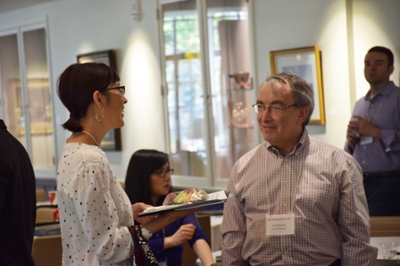
Larry Bartels after his presentation at CAB.
His keynote address explored whether this trend carries over to other democracies.
Across countries in the Organization for Economic Cooperation and Development (OECD), Bartels finds that “policymakers listen to people with money”—the preferences of high-income individuals are significantly more likely to be reflected in actual policy than the preferences of low-income people.
Bartels presented data from several surveys, including the International Social Survey Program and World Values Surveys, as well as OECD social expenditures data, looking at support for social spending among both high- and low-income groups. Overall, he finds that social expenditures are correlated with public preferences, but that spending is most responsive to the preferences of the most affluent.
“Responsiveness is largely or wholly limited to affluent citizens,” he concluded, noting that this pattern of responsiveness holds across democracies with different political cultures, institutions, and levels of inequality.
The Politicization of Place
“Where we live can influence how we think and act in politics,” said Cara Wong of the University of Illinois, Urbana-Champaign. But can politics shape how we think about the areas around us?
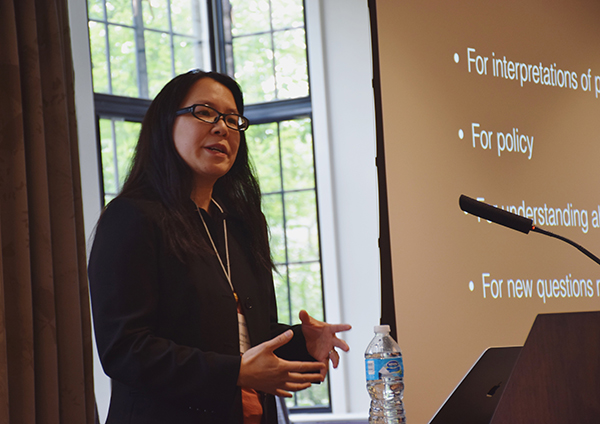
In a study conducted in Canada, Wong and her colleagues asked participants to map what they perceived as their local community. The communities that respondents drew came in a “variety of sizes and shapes,” Wong reported.
While research studies typically measure local areas in terms of neatly defined objective units, such as census tracts, individuals’ more varied subjective contexts, as shown by the mapping, can affect them in ways not captured by this research, she explained.
Wong also discussed her work on how politics can shape the way individuals view these contexts, as seen in a survey conducted in the United Kingdom. Using data from the British Election Survey, she and her colleagues found that respondents who were contacted by the anti-immigration U.K. Independence Party reported that their communities were becoming more diverse than those who were not contacted.
“We find some evidence that being contacted by an anti-immigration party leads people to change how they view diversity in what they perceive as their local community,” said Wong, further emphasizing how perceptions of place can become politicized and the importance of trying to capture these more subjective perceptions of place in research.
The Politics of Homeownership
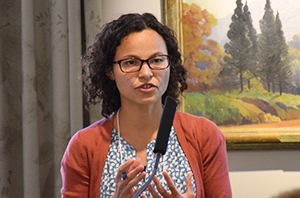
How do citizens engage with the government when policies are delivered indirectly with no direct government-citizen interaction? Political scientist and IPR associate Chloe Thurston examines citizen engagement in response to the federal government’s efforts to increase access to homeownership beginning in the 1930s.
With private lenders able to offer government-insured loans, homeownership grew rapidly in this period. However, government guidelines discouraged lending to racial minorities. Such “boundaries to access”—shaped by the government but often implemented indirectly—can mobilize citizen groups, Thurston explained, as was the case with the NAACP’s efforts to increase equal access to housing.
“Groups use these ‘boundaries to access’ as tangible focal points to launch criticisms of the government’s role in limiting their access,” she said in summarizing her work, which is part of her forthcoming book. “And they argue that the federal government has the authority and the obligation to change its role.”
The Politics of Deciding What's News
“We know a lot about how individuals experience the news media,” Wagner said. “We know far less about how journalists themselves think about what’s newsworthy and how journalists perceive bias.” So he set out to test how newsworthiness and bias can vary.
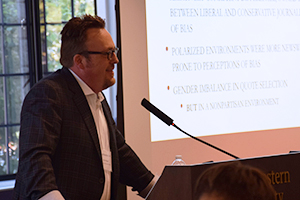
In one experiment, Wagner discovered that journalists, regardless of their personal political stance, deemed “costly” talk that challenged the expected party position—such as a Republican defending the Affordable Care Act—more newsworthy than “cheap” talk that toed the partisan line. In terms of bias, however, he found that ideological journalists—liberals and conservatives—were more likely to perceive bias in a story featuring costly talk by a member of their own party, with conservative journalists especially likely to perceive bias in such cases.
In a second experiment, he found that political environment matters: “The more polarized the political environment, the more newsworthy costly talk seems to be,” he said, adding that journalists are also more likely to perceive bias when political polarization is high.
Wagner concluded by presenting a third experiment, which examined the quotes that journalists choose to use. Overall, he found, costly quotes are considered more newsworthy, but both male and female journalists are more likely to use a quote from a man than a woman.
Engaging Graduate Students and Junior Scholars
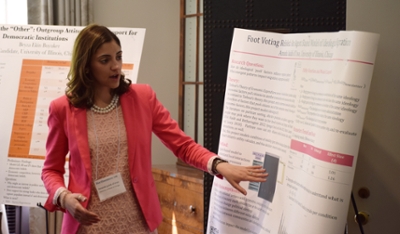
For the first time, CAB also featured a formal poster session for graduate students and junior scholars, in addition to its regular inclusion of mentoring opportunities.
University of Iowa graduate student Christine Bricker, who presented her work on individuals’ perceptions of where they live, had the chance to discuss her project and research methods with Wong.
“I wouldn’t have had the chance to meet with her otherwise,” Bricker said.
“CAB is one of my favorite academic events of the year,” said Amanda Sahar d’Urso, a graduate student at the University of Illinois at Chicago, who was excited to have been paired with Bartels for a lunchtime mentoring session. “Jamie [Druckman] and everyone always find ways to integrate graduate students, which is very unique.”
James Druckman, Payson S. Wild Professor Political Science and an IPR fellow, organized CAB with IPR graduate research assistants Ethan Busby and Jacob Rothschild. Larry Bartels is May Werthan Shayne Chair of Public Policy and Social Science at Vanderbilt University. Cara Wong is associate professor of political science at the University of Illinois, Urbana-Champaign. Chloe Thurston is assistant professor of political science and an IPR associate at Northwestern. Michael Wagner is associate professor at the University of Wisconsin-Madison’s School of Journalism and Mass Communication.
This year’s event was sponsored by IPR, the Weinberg College of Arts and Sciences, and Northwestern’s Political Science Department. To sign up for notification of future CAB events, email ipr@northwestern.edu.
Published: May 31, 2017.